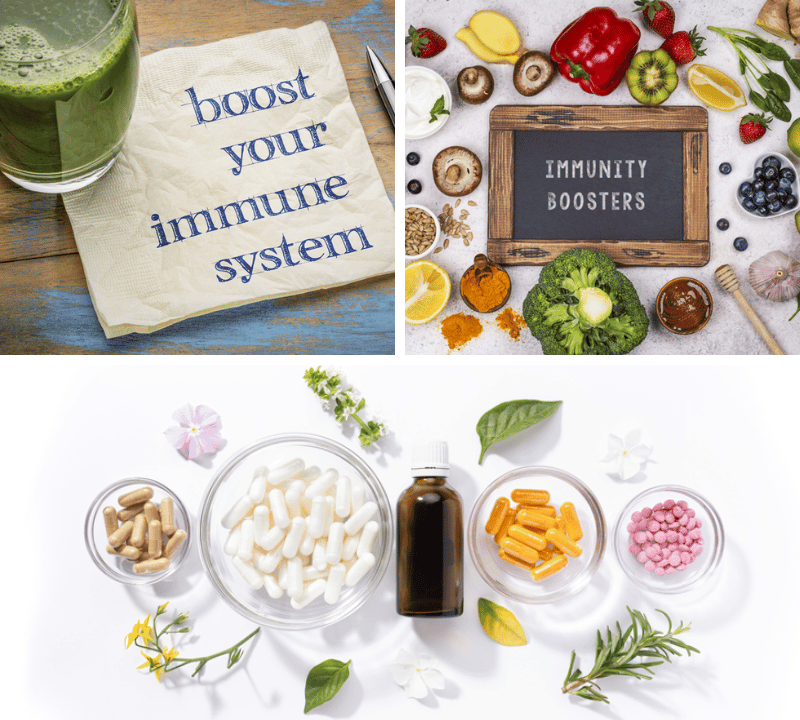Understanding how to fortify your immune system is crucial in your quest for a healthier life, especially in a world where new health challenges emerge frequently. If you've ever wondered, "What is the best supplement for immune system support?" you're not alone. This comprehensive guide delves into the essential vitamins, minerals, and herbs celebrated for their immune-boosting properties. From the powerhouse Vitamin C to the ancient remedy of elderberry, we'll explore how these dietary supplements can be pivotal in maintaining a robust immune system.
Navigating the array of supplements available can be daunting, but knowing which ones can genuinely support your immune health is essential. Supplements like Vitamin C, Vitamin D, and Zinc are not just buzzwords; they play integral roles in enhancing immune function and fortifying your body’s defenses against pathogens. This article highlights the best immune-boosting supplements and underscores the importance of a balanced lifestyle with a healthy diet and regular exercise. As we dive deeper, remember that these supplements should complement—not replace—your health regimen, and consulting with healthcare professionals is vital to tailor these suggestions to your unique health needs.
Key Takeaways
- Supplements can support the immune system by providing essential vitamins and minerals, but they should complement a healthy lifestyle, including a balanced diet and regular exercise.
- Essential vitamins such as C, D, and E and minerals like zinc and selenium are crucial in enhancing immune function and protecting against pathogens.
- Consulting with healthcare professionals is essential when choosing supplements to ensure they are tailored to individual health needs and to avoid potential risks and interactions.
Understanding Immune System Supplements
Consider the immune system, a sophisticated network of blood cells, tissues, and organs that protects the body. It employs innate responses—our immediate line of defense—and adaptive responses tailored to specific pathogens. Like any well-oiled machine, this system requires the right fuel to function optimally, and that’s where supplements step in. They’re not a panacea, but when used judiciously, they can provide the essential vitamins and minerals our body’s defense mechanisms crave to keep our immune system healthy.
However, it’s paramount to acknowledge that supplements should complement, not replace, a healthy lifestyle. While they can enhance immune function and potentially reduce the risk of infectious diseases, they must be balanced with proper nutrition and exercise. Seek guidance from a healthcare professional before embarking on any supplement regimen, as the landscape of immune-boosting supplements is complex, and one size does not fit all.
Critical Vitamins for Immune Health
Vitamins are the unsung heroes of immune health, each wielding unique powers to safeguard our well-being. The alliance of Vitamins C, D, and E is formidable, playing distinct yet interlinked roles in supporting and enhancing immune system function. These vitamins are the sentinels that ensure our immune cells are vigilant, our responses are swift, and our immune system remains robust against the onslaught of pathogens.
Vitamin C

Vitamin C is a versatile guardian of our immune system, supporting both the innate and adaptive immune systems. It accumulates in phagocytic cells, enhancing their ability to chase, engulf, and eliminate microbial intruders. An inadequate supply of this nutrient can leave us vulnerable, underscoring the importance of maintaining sufficient levels through diet or vitamin C supplements.
Moreover, Vitamin C is a beacon, guiding the differentiation and proliferation of B- and T-cells, essential players in our immunological army. Given that our bodies neither produce nor store Vitamin C, a diet rich in citrus fruits, peppers, kiwifruit, and other vitamin C-packed foods is crucial. For those unable to meet their needs through diet alone, vitamin C supplementation can be a lifeline, especially in bolstering the body’s resistance to respiratory infections and reducing the duration of colds.
Vitamin D

Vitamin D, the sunlight vitamin, influences immune health by enhancing the pathogen-fighting effects of white blood cells and modulating inflammation. Its deficiency is a shadow over our immune defenses, as low levels are linked to an increased risk of respiratory infections. While some studies suggest that Vitamin D supplementation can shield against influenza, others show mixed results, painting a complex picture of its role in immune health.
Given the scarcity of Vitamin D in food and its limited production in the skin during winter, supplementation is often a practical strategy to ensure adequate levels and prevent vitamin D deficiency. Oily fish, red meat, and egg yolks are some dietary sources, but for many, a daily dose of sunshine in a bottle—Vitamin D supplements—can help maintain a healthy immune system year-round.
Vitamin E

Vitamin E is a formidable antioxidant, preserving cell membrane integrity and ensuring the immune system’s soldiers—antibodies and lymphocytes—are well-equipped for battle. This vitamin is particularly adept at tempering inflammation, thus preventing it from undermining immune function.
To harness its protective powers, turn to nuts, seeds, vegetable oils, and leafy greens, which are not only delicious but also rich sources of Vitamin E. Alternatively, consider taking vitamin E supplements to ensure you’re getting enough of this essential nutrient.
Suppose you're considering supplementing your diet with Vitamin E and wondering which product might be best for you. In that case, our article, "5 Of The Best Vitamin E Supplements to Consider: Benefits and More," reviews five top choices. This guide provides detailed insights into each product's benefits, helping you make a well-informed decision. For a deeper dive into the best Vitamin E supplements on the market, follow the link below.👇
Essential Minerals for Immune Support

While vitamins often capture the limelight, minerals play an equally pivotal role in the theater of immune defense. Zinc and selenium are the stalwart allies our immune system relies on to perform at its peak. These essential minerals are the building blocks for many immune processes, from cell production to antioxidant defense, and are vital for maintaining a responsive and resilient immune system.
Zinc and Selenium
Zinc and Selenium are two minerals that play pivotal roles in maintaining and enhancing immune health. Zinc is essential for the anti-inflammatory and antioxidant defense within the body and crucial for developing and functioning immune cells, including T cells.
Oysters stand as the champions of zinc content, but this mineral is also abundant in:
- crab
- lobster
- meats
- legumes
- nuts
However, while zinc supplementation can aid immune recovery, it's important to adhere to safe intake levels to avoid detrimental effects.
Selenium, on the other hand, is a trace mineral that has a mighty role in activating the immune system and calibrating its response to prevent chronic inflammation and autoimmune disorders. Incorporating selenium-rich foods like Brazil nuts, tuna, halibut, and poultry into your diet can enhance your immune system's ability to respond to health threats effectively. Although selenium supplementation offers benefits, particularly in conditions like HIV, maintaining safe daily intake levels is crucial to prevent toxicity.
For those looking to combine the benefits of both these powerful mineral supplements, our article, "The Health Enthusiast's Dream: Five Of The Best Zinc Selenium Supplements You Need to Know," provides a detailed overview of top-rated products that integrate zinc and selenium. This guide is especially useful for readers eager to explore combined supplementation options that can bolster their immune defenses. For a comprehensive review and to get a head start on selecting the right supplement for your needs, check out the link below.👇
Herbal Supplements with Immune Boosting Properties
Beyond vitamins and minerals, the botanical world offers a treasure trove of herbal supplements that can boost your immune system. From the roots of traditional Chinese medicine to modern clinical research, herbs like elderberry, echinacea, and garlic are revered for their ability to fortify the immune system and offer a natural line of defense against pathogens.
Elderberry
Elderberry, the dark berry of the Sambucus tree, is celebrated for its antiviral and anti-inflammatory prowess. By thwarting virus binding and stimulating immune responses, elderberry supplements show promise in reducing the duration of upper respiratory symptoms, offering a natural remedy for those seeking relief from the common cold and flu.
Echinacea
The purple coneflower, echinacea, has been a staple in the realm of immune support for generations. While not a cure-all, its potential to ward off infections and viruses can be a valuable addition to an immune health regimen. The recommended dosages vary, whether in encapsulated form or as a tincture and should be tailored to individual needs under the guidance of a healthcare professional.
While echinacea may not drastically shorten the duration of colds, its ability to slightly reduce the risk of developing them is a boon for those seeking natural preventative solutions. Its role in supporting immune health is a testament to the potential of herbal supplements to complement traditional approaches to wellness.
Garlic
Garlic, the culinary staple with a pungent aroma, is also a potent immune-boosting ally. The compound allicin, responsible for garlic’s distinctive smell, is credited with its antimicrobial and antiviral properties, harnessed in supplements to support overall immune health.
Whether used in cooking or as a concentrated supplement, garlic’s benefits for the immune system are as undeniable as its flavor.
Probiotics and Immune Function
The bustling ecosystem within our gut plays a starring role in immune function. A diverse microbiome, thriving with beneficial bacteria, is critical for maintaining a healthy immune system and combating chronic inflammation. Probiotics in fermented foods and supplements act as stewards of this microbial harmony, helping regulate immune responses and bolster gut lining functions.
Clinical trials have illuminated the positive impact of probiotics on reducing the risk of respiratory tract infections, particularly in infants and children. By supporting the body’s natural defenses and managing symptoms of infectious diarrhea, probiotics exemplify the symbiotic relationship between our microbiome and immune health. Moreover, maintaining a healthy microbiome may also play a role in preventing more severe conditions, such as acute respiratory distress syndrome.
Omega-3 Fatty Acids and Immunity
The fatty acids that ride the ocean's waves—EPA and DHA—are heart-healthy and allies of the immune system. Omega-3 fatty acids, abundant in fish oil, fatty fish, and marine algae, for our vegan friends, have the remarkable ability to:
- Quell inflammation
- Modify immune cell membranes, thereby enhancing their function
- Promote regulatory T-cell proliferation
- Scale down inflammatory responses
These lipids are the peacemakers of the immune system.
The benefits of omega-3 fatty acids extend beyond inflammation moderation. By boosting the phagocytic capacity of neutrophils, these fatty acids help ensure that our first line of defense remains vigilant and effective. Incorporating omega-3-rich foods into one’s diet or choosing supplementation can thus be a strategic move for those aiming to support their immune function.
Choosing the Right Supplement for You
Embarking on the path of dietary supplements is a personal journey that requires thoughtful navigation and professional guidance. A healthcare professional can help tailor a supplement regimen that aligns with individual health needs and lifestyle, taking into account factors such as:
- gender
- age
- dietary habits
- potential medication interactions
When selecting supplements, it’s essential to consider both quality and quantity. Here are some tips to keep in mind:
- Look for third-party testing to ensure potency and purity.
- Avoid proprietary blends that obscure the precise amounts of ingredients.
- Find the right allies for your unique health profile.
- Fortify your immune defenses with precision and care.
Potential Risks and Considerations
As with any intervention, supplements are not free from risks. The potential for side effects or interactions with medications necessitates caution and consultation with healthcare professionals before introducing new supplements to one’s routine. High doses of vitamins A and D, for instance, can have adverse effects, emphasizing the need for adherence to recommended intakes.
Particular caution is warranted with certain minerals, such as zinc and selenium, where excessive intake can lead to adverse health consequences. And while probiotics are generally safe, they may pose risks for immunocompromised individuals. This highlights the importance of balancing the immune-boosting potential of supplements with an awareness of their limitations and risks.
Incorporating Supplements into a Healthy Lifestyle
Supplements are most effective when part of a comprehensive strategy for immune health, which includes a balanced diet rich in whole foods, consistent exercise, and restorative sleep. The synergy between these elements creates a robust immune system capable of withstanding the challenges of pathogens and stress.
Consulting with a healthcare professional can help prioritize these lifestyle changes, especially for those with demanding schedules who may struggle to maintain a healthy balance. By integrating supplements into a well-rounded approach to health, one can improve immune function and optimize their overall well-being.
Time to Summarize Our Discussion on Immune Health!
In our exploration of enhancing immune system health, we have delved into a vast array of supplements that serve as potent allies for your immune system. Essential nutrients such as Vitamin C, Vitamin D, and zinc, along with specialized options like herbal remedies, probiotics, and omega-3 fatty acids, have been discussed in detail, showcasing their unique roles in supporting a healthy immune system. Each of these supplements offers specific benefits, whether boosting immune function, reducing inflammation, or fortifying the body’s defenses against respiratory infections and other health threats.
However, achieving optimal immune health extends beyond supplement intake. Embracing a holistic approach is fundamental; this includes maintaining a balanced diet, ensuring adequate sleep, and engaging in regular physical activity. These lifestyle factors work synergistically with supplements to strengthen your immune system. Consulting with healthcare professionals is also crucial to tailor your supplement regimen to your personal health needs and to ensure you are safely enhancing your immune function.
Our website's search bar is a valuable tool for those interested in further exploring the benefits of specific supplements like omega-3 fatty acids or the traditional use of elderberry. It grants access to a wealth of previously published articles that provide deeper insights into these and other immune-boosting supplements. By integrating these practices and utilizing our resources, you can promote your overall health more effectively and keep your immune system robust and ready to defend against any challenge.
Still, Have Questions? Here are Brief Answers to FAQs
Can vitamins really boost my immune system?
Vitamins such as C, D, and E can support immune function by helping the body fight infections and regulate inflammation. Still, they should be part of a holistic approach to health, including a balanced diet and lifestyle.
Are there any risks associated with taking immune-boosting supplements?
Yes, taking immune-boosting supplements can pose risks, especially if consumed excessively or in combination with certain medications. It's important to consult a healthcare professional before starting any supplementation.
How do I know which supplements are right for me?
Consulting with a healthcare professional who can consider your health history, diet, and lifestyle is the best way to determine the right supplements for your needs. This personalized approach will ensure you're taking the supplements that are most beneficial for you.
Can herbal supplements like echinacea and garlic prevent colds?
Herbal supplements like echinacea and garlic can support immune health and reduce the risk of developing colds or the duration of symptoms, but they are not guaranteed to prevent colds.
Should I take probiotics to boost my immune system?
Yes, taking probiotics can help boost your immune system by promoting a healthy gut microbiome, but it's important to consult with a healthcare professional for personalized advice.
Thanks for taking this journey to explore the best supplement for your immune system. If you want to add to your library of knowledge and are interested in diving deeper into some of the supplements mentioned in this article, you should check out the links above. It could be a huge time-saver - you won't be sorry you took a look.
Also, please return soon to check out our next review of another incredible supplement – we’re always looking out for YOU!
*We are NOT qualified medical advisors. The content here is only based on our personal opinions and research and should NOT be used as a substitute for a healthcare professional's advice!











Member discussion